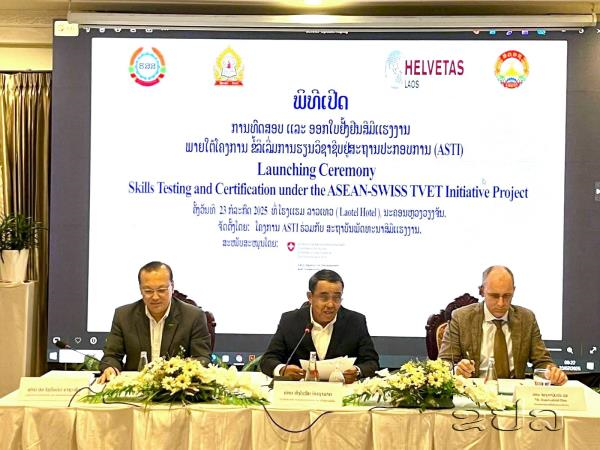KPL
The Government of the Lao People’s Democratic Republic, in partnership with the ASEAN-Swiss TVET Initiative (ASTI), officially launched the Skills Testing and Certification Programme on July 23 in Vientiane. The initiative aims to enhance national workforce standards and promote equitable employment opportunities for Lao workers across the country.

(KPL) The Government of the Lao People’s Democratic Republic, in partnership with the ASEAN-Swiss TVET Initiative (ASTI), officially launched the Skills Testing and Certification Programme on July 23 in Vientiane. The initiative aims to enhance national workforce standards and promote equitable employment opportunities for Lao workers across the country.
The launch ceremony was co-chaired by Mr. Phongsaysak Inthalath, Deputy Minister of Labour and Social Welfare; Mr. Xaybandith Rasphone, Vice President of the Lao National Chamber of Commerce and Industry; and Mr. Jean Gabriel Duss, Head of the Regional Cooperation Office of the Swiss Cooperation and Consultancy Office and Head of Helvetas. The event brought together key development partners, private sector representatives, and other stakeholders.
In his remarks, Deputy Minister Phongsaysak underscored the importance of skills testing in evaluating workers’ capabilities and recognizing existing skills in line with national standards. He emphasized that certification enables experienced workers—especially those without formal qualifications—to gain recognition, promoting lifelong learning and encouraging continual upskilling to meet evolving market and technological demands.
“Skills testing will become a vital tool for matching employees with the right jobs and ensuring fair, skills-based remuneration,” he said, noting its role in reducing labor turnover, retaining skilled workers, and mitigating labor migration pressures.
The programme, part of ongoing ASEAN-Swiss cooperation, targets young men and women, particularly early school leavers, low-skilled workers, and those from marginalized communities. It seeks to provide them with market-relevant vocational skills to improve their employment prospects and economic resilience.
Aligned with national policies, the initiative supports the Party-Government’s efforts to empower women, youth, and self-employed individuals through improved access to quality skills training. A key goal of the programme is to test and certify 250,000 individuals nationwide between 2026 and 2030, contributing to a more capable, competitive, and inclusive workforce.
The programme is expected to play a crucial role in supporting Laos’ socioeconomic development, enhancing productivity, and ensuring that the country’s human capital can effectively meet regional and global labor market demands.
KPL